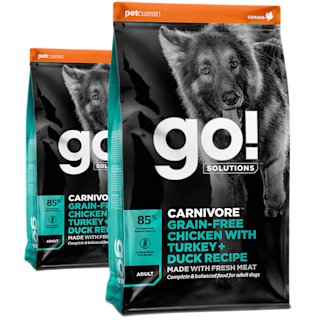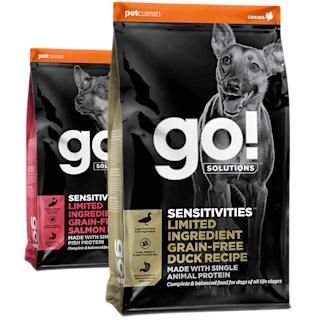November 9, 2022
What's the Best Protein for Dogs?

Let’s get ready to talk about all things protein. What's the best protein for dogs, and why do dogs need it? Proteins are one of the building blocks of your dog’s body and consist of chains of amino acids. They can range in size from only a few amino acids to large, complex molecules.
Sources of Protein
There are a few different types of protein sources. Good sources of protein that are commonly used in dog foods fall into three main categories:
Named meat meals, like chicken meal and lamb meal.
Fresh meat, fish, and poultry, including de-boned turkey, de-boned venison, and de-boned salmon.
Plant-based proteins such as peas, lentils, and beans.
Common Animal Proteins in Dog Food:
- Duck
- Chicken
- Lamb
- Wild Boar
- Turkey
- Fish, such as salmon and cod
- Venison
- Beef
How Much Protein Does My Dog Need?
Protein is used for supporting muscle maintenance and growth. Very active dogs may require increased protein due to increased strain on their muscles from strenuous exercise.

Recommended Solution
Protein-Packed, Premium Dog Food Recipes
Indulge your dog's carnivorous instincts with our Go! Carnivore meat-based dog food recipes. Specially designed for high-energy canines with an assortment of premium animal proteins for a healthful, hearty meal.
View Carnivore dog food
For most dogs, a more moderate protein level is often recommended.

What's the Best Protein for Dogs with Allergies?
Some dogs may experience adverse reactions to some of the proteins that are commonly used in dog foods. Common symptoms of food intolerances are itchy skin, chronic digestive upset diarrhea, and recurrent ear infections. Typically, food intolerances are often related to dietary protein and a limited ingredient, novel protein diet may be helpful in identifying this offending ingredient.

Recommended Solution
Limited Ingredient Dog Food Made by Pet Nutrition Experts
These grain-free, gluten-free, and chicken-free recipes limit contact with common food allergens — providing all the nutrition your dog needs using as few key ingredients as possible.
View Sensitivities dog food
Novel Protein Examples:
- Duck
- Lamb
- Salmon
- Turkey
- Venison
- Pollock
- Kangaroo
- Pheasant
In Summary
Protein is a vital component in your dog’s food and provides the essential amino acids to help keep your pet strong and healthy. Whether your dog needs a diet that is high in protein, moderate in protein, or contains a novel protein, be sure to choose a diet with premium-quality protein sources to meet your dog’s dietary needs.



